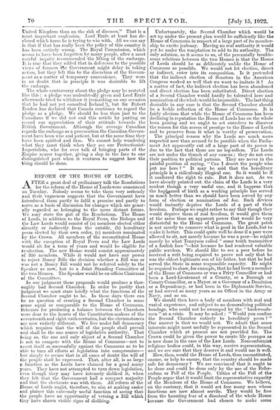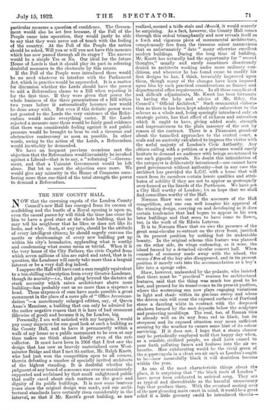REFORM OF THE 110USE OF LORDS. A FTER a great deal
of preliminary talk the Resolutions for the reform of the House of Lords were announced on Tuesday. Nobody seems to take them very seriously and their vagueness suggests that the Government have introduced them partly to fnlfil a promise and partly to serve as a basis of discussion for changes which are gener- ally regarded as belonging to the more distant future. We may state the gist of the Resolutions. The louse of Lords, in addition to the Royal Peers, the Bishops and the Law Lords would consist of (a) members elected either directly or indirectly from the outside, (b) hereditary peers elected by their own order, (c) members nominated y the Crown. All members of the reconstituted House with the exception of Royal Peers and the Law Lords would sit for a term of years and would be eligible for re-election. The new House would consist approximately of 350 members. While it would not have any power to reject Money Bills the decision whether a Bill was or was not a Money Bill would not be referred solely to the Speaker as now, but to a Joint Standing Committee of the two Houses. The Speaker would be ex-officio Chairman of the Committee.
In our judgment the proposals would produce a thor- oughly bad Second Chamber. In order to justify that judgment we must state briefly what the functions of the Second Chamber ought to be. In these days there can be no question of creating a Second Chamber in some sense equal or comparable to the House of Commons. Schemes for producing a balance between the Chambers were dear to the hearts of the Constitution-makers of the seventeenth and eighteenth centuries, but the circumstances are now entirely different. We live under full democracy which requires that the will .of the people shall prevail and shall be the one source of legislative authority. That being so, the one and only object of a Second Chamber Is not to compete with the House of Commons—not to assert itself so successfully against the Commons as to be able to turn all efforts at legislation into compromises— but simply to secure that in all cases of doubt the will of the people shall be expressed. That, after all, is as large g function as the Lords have claimed for a good many ?irears. They have not attempted to turn down legislation, even though they may have intensely disliked it, when they felt that the Government had a compact majority and that the electorate was with them. All reform of the douse of Lords ought, therefore, to aim at making easier and plainer this extremely useful function of seeing that the people have an opportunity of vetoing a Bill which they have shown visible signs of disliking. Unfortunately, the Second Chamber which would be set up under the present plan would be sufficiently like the House of Commons in respect of a large part of its member. ship to excite jealousy. Having no real authority it would yet be under the temptation to add to its authority. The only solution, as it seems to us, of the perennially trouble- some relations between the two Houses is that the House of Lords should be as deliberately unlike the House of Commons as possible. We would not let election, direct or indirect, enter into its composition. Is it pretended that the indirect election of Senators in the American Congress worked so well that we want to imitate it ? As a matter of fact, the indirect election has been abandoned and direct election has been substituted. Direct election of a Second Chamber would hardly be tolerated here and nomination of the whole would be impossible. The last thing desirable in any case is that the Second Chamber should be a feeble reflection of the House of Commons. It is fairly obvious that while the House of Commons has been declining in reputation the House of Lords has on the whole been gaming and we ought to set ourselves to discover the reason for this access of prestige to the House of Lords and to preserve from it what is worthy of preservation. The principal reason why the Lords are much more respected now than seemed to be possible when the Parlia- ment Act apparently cut off a large part of its power is due to the fact that there are no log-rollers. The Lords are not under the thumb of any caucus ; they do not owe their position to political patrons. They are never in the painful position of saying, " Can I desert the people who put me here ? " It may be said that the hereditary principle is a ridiculously illogical one. So it would be if it conferred the right to rule. But it does not. As we have already pointed out, the claim of the Lords is a very modest though a very useful one, and it happens that the haplipard of birth as a working principle has served us much-better than we should have been served by any form of election or nomination ad hoc. Such devices would instantly deprive the Lords of a part of their freedom. Perhaps we ought rather to say that though they would deprive them of real freedom, it would give them at the same time an apparent power that would be very distasteful to the House of Commons. The great point is not merely to conserve what is good in the Lords, but to make it better. This could quite well be done if a peer were allowed to sit, not merely because he was a peer—he might merely be what Tennyson called " some tenth transmitter of a foolish face "--but because he had rendered valuable public services. We should kle to see a peer before he received a writ being required to prove not only that he was the eldest legitimate son of his father, but that he had served the State in some responsible capacity. He might be required to show, for example, that he had been a member of the House of Commons or was a Privy Councillor or had been a Lord-Lieutenant of a County, or a Borough or County Councillor, or a Mayor, or a Governor of a Dominion or a Dependency, or had been in the Diplomatic Service, or had served so many years as an Officer in the Army or Navy, and so on.
We should then have a body of members with real and varied experience, and subject to no demoralizing political bondage, who could not be swamped by the " backwoods- men " at a crisis. It may be asked : Would you confine the Second Chamber entirely to hereditary peers ? " Our answer is that we would not. We admit that some interests might most usefully be represented in the Second Chamber which at present are not provided for. The Crown could be given the power to create life peerages as is now done in the case of the Law Lords. Nonconformist religious bodies could, in this way, receive representation, and we are sure that they deserve it and would use it well. How, then, would the House of Lords, thus reconstituted, ensure, or help to ensure, that the country should be made safe for democracy ? We are convinced that it ought to be done and could be done only by the use of the Refer- endum or Poll of the People. Critics of the Poll of the People argue that it would limit the representative capacity of the Members of the House of Commons. We believe, on the contrary, that it would set free many men whose functions are now almost servile. They would be free from the haunting fear of a dismissal of the whole House because the Government had chosen to make some particular measure a question of confidence. The Govern- ment would also be set free because, if the Poll of the People came into operation, they would justly be able to say that they were never out of touch with the feeling of the country. At the Poll of the People the nation should be asked, Will you or will you not have this measure which has now passed through all its stages ? The answer would be a simple Yes or No. Our ideal for the future House of Lords is that it should play its part in referring doubtful measures to the electorate by this means. If the Poll of the People were introduced there would be no need whatever to interfere with the Parliament Act, which in practice would be superseded. It is a matter for discussion whether the Lords should have the power to add a Referendum clause to a Bill when rejecting it for the first time. If they were given that power the whole business of the three presentations of a Bill within two years before it automatically becomes law would be done away with. But even if this definite power were not granted to the Lords the very existence of the Refer- endum would make everything easier. If the Lords rejected a measure once there would be fairly good evidence that there was considerable feeling against it and public pressure would be brought to bear to end a tiresome and obstructive controversy as soon as possible. In other words, owing to the action of the Lords, a Referendum would inevitably be demanded.
We have on frequent previous occasions met the objection that the. Referendum would invariably be invoked against a Liberal—that is to say, a "reforming "—Govern- ment, and that a Unionist Government would be left alone. But let us meet the objection once more. We would give any minority in the House of Commons num- bering more than one-third of the total strength the power to demand a Referendum.



































 Previous page
Previous page